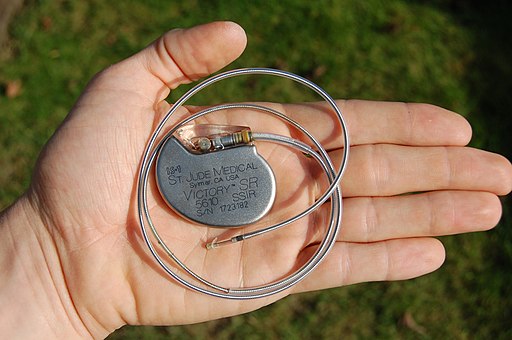The Copyright Office has once again opened its triennial rulemaking proceedings for exemptions to the anti-circumvention clauses of the Digital Millennium Copyright Act (“DMCA”). This will be the seventh iteration of the rulemaking proceedings for the Copyright Office since Congress enacted 17 U.S.C. § 1201 in 1998 to reinforce copyright protection against an envisioned increase in piracy due to technological advancement. The anti-circumvention law prohibits the use of technology to bypass technology protection measures (“TPM”) that copyright owners implement, such as encryption tools that prevent consumers from copying movies or songs off a disk or simple password systems for website content or software “locking” mechanisms that prevent copying. Unfortunately, the broad reach of 17 U.S.C. § 1201 also jeopardized many otherwise non-infringing and publicly-beneficial activities that may require circumventing TPMs.

An artificial pacemaker (serial number 1723182) from St. Jude Medical, with electrode. By Steven Fruitsmaak, via Wikimedia Commons.
In an effort to rescue circumvention for lawful purposes, Congress identified certain classes of permanent exemptions to the anti-circumvention law, allowing, for example, reverse engineering research and security testing to be valid reasons for circumventing technological protections measures. In addition to the permanent exemptions, Congress also created the triennial rulemaking mechanism which creates 3-year temporary exemptions as a catch-all to prevent the anti-circumvention law from prohibiting lawful practices.
For the upcoming 2018 rulemaking proceedings, the Cyberlaw Clinic has submitted an anti-circumvention exemption request on behalf of the Software Preservation Network (“SPN”) and a renewal request on behalf of a coalition of medical device patients and researchers (“Medical Device Coalition”) for the Copyright Office’s seventh triennial rulemaking proceedings for anti-circumvention exemptions under the Digital Millennium Copyright Act (“DMCA”). SPN seeks an exemption for libraries and archival institutions to circumvent technology protection mechanisms for the preservation of software for future research or usage. The Medical Device Coalition seeks a renewal for an exemption that the Cyberlaw Clinic successfully helped to secure in the 2015 rulemaking proceedings, which permits patients and security researchers to circumvent technological measures in medical devices to access output data. The SPN petition and medical device renewal request join 22 other new exemption petitions and 38 other exemption renewal requests submitted for the 2018 rulemaking proceedings.
Filed in: Clinical Spotlight
Tags: Cyberlaw Clinic
Contact Office of Clinical and Pro Bono Programs
Website:
hls.harvard.edu/clinics
Email:
clinical@law.harvard.edu